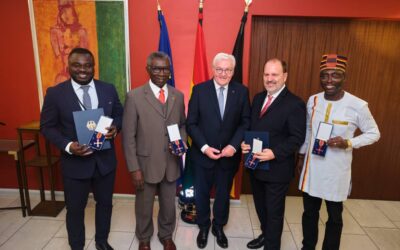Source:A news Desk Report
The Government of Ghana through the Commission for Technical and Vocational Education and Training (CTVET) ,has trained over 19,000 master craft persons and apprentices since 2018 under the Ghana TVET Voucher Project (GTVP).
Out of the over 19,000 people, 13,883 of them representing 73 per cent of the beneficiaries are females, whilst 5,179 representing 27 are males.
The Head of Corporate Affairs for CTVET, Mr. Albert Opare, who announced this explained that the Ghana TVET Voucher project (GTVP) is a project under the Ghanaian-German Financial Development Cooperation, co-financed by the German Federal Ministry for Economic Cooperation and Development (BMZ) through KfW Development Bank and the Government of Ghana, whiles CTVET is the implementing agency.

Mr Opare announced this on Friday when he interacted with the media after an official visit to the Dabokpa Technical Institute in Tamale in the Northern region, one of the beneficiary institutions of the project.
Demand-driven initiative
He stated that the GTVP provides demand-driven training vouchers to CTVET-registered master craft persons, their apprentices and workers, adding that the vouchers are used to fund competency-based training (CBT) courses in CTVET–-accredited training institutions for certification in National Proficiency Levels I and II and Certificate I and II respectively.
Mr. Opare indicated that the beneficiaries received the training in skills areas such as automotive repairs, cosmetology, garment, welding, consumer electronics, plumbing, electrical installation, block laying and furniture making.
He hinted at plans to expand the project by the government even further and has secured additional funding of 60 million dollars from the World Bank and 40 million Euros from the German Government through KFW Bank to train at least 50,000 more beneficiaries over the next five years.
Great impact
The Head of Corporate Affairs indicated that, in addition to the training provided, the GTVP project has had a very positive impact on the TVET system in Ghana, a key among them being that numerous training institutions have been encouraged through the project to register with CTVET and are keen to achieve official accreditation for CBT implementation.
Again he stated that this had resulted in trade associations and informal sector training providers being encouraged to register with CTVET.
Background
As a result of the implementation of the project, the country has witnessed the Competency Based Training (CBT) approach being implemented on a large scale for a large number of Ghanaian youths.
This has led to the modernization of the traditional apprenticeship system in Ghana through the implementation of the project, and this has strengthened CTVET as the regulatory body for TVET in Ghana.






















